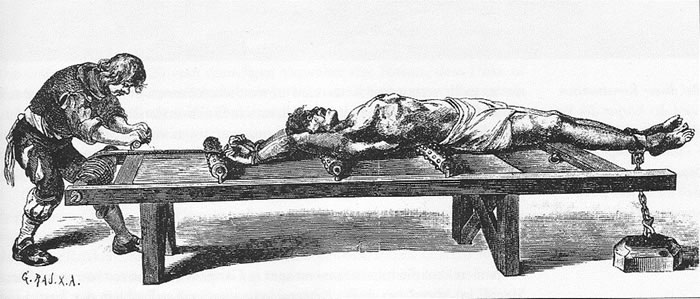


The European Stability Initiative (ESI) and the Carr Center for Human Rights Policy at the Harvard Kennedy School
organize the second ESI "Future of human rights" Berlin conference
Costs and Consequences of Torture
U.S. and European Perspectives
Berlin, 7-8 July 2015

Why this event?
If the red lines surrounding the taboo on torture are erased some of the most important achievements of the human rights movement in recent decades are imperiled.
How real is this threat in 2015? What can be done to best counter it?
ESI and the Carr Center for Human Rights Policy at Harvard invite academics and practitioners to Berlin for two days to explore this question:
- The current debate on torture, enhanced interrogation and extraordinary rendition in the US – where is it going after last year's US Senate report?
- The European perspective on the US debate on torture
- Challenges to the European human rights architecture from autocracies in Eastern Europe – and indifference among democratic members; the case of torture in Russia and Azerbaijan and the Council of Europe and the European Union
- Academics and the human rights movement: how to take the debate further?
- Current U.S. and European debates on torture and extraordinary rendition
- Changing public opinion concerning torture in the United States and Europe
This project is a part of continuous efforts and events of both ESI and Harvard Carr Center in the field of human rights protection


Background on the issue
I. ESI and Harvard Carr Center:
- "The Cost and Consequences of Torture," Carr Center for Human Rights Policy, Harvard Kennedy School, June 2015.
- Gerald Knaus, "Europe and Azerbaijan: The End of Shame," Journal of Democracy, 26(3), July 2015.
- Jane Mayer, "The Memo," The New Yorker, 27 February 2006.
- European Stability Initiative, "Azerbaijan – and the future of human rights in Europe," 15 June 2015.
II. Other recommendations:
- Connie Bruck, "The Inside War," The New Yorker, 22 June 2015.
- Amnesty International, "Breaking the Conspiracy of Silence: USA's European 'Partners in Crime' must act after Senate Torture Report," 2015.
- Senate Select Committee on Intelligence, "Committee Study of the Central Intelligence Agency's Detention and Interrogation Program," April 3, 2014,
- Dick Marty, "Secret Detentions and Illegal Transfers of Detainees Involving Council of Europe Member States: Second Report," Committee on Legal Affairs and Human Rights Parliamentary Assembly, Council of Europe, 7 June 2007.
- David Cole, "The Torture Memos: The Case Against the Lawyers," The New York Review of Books, 10 September 2009.
- Philippe Sands, Torture Team: Uncovering the Crimes in the Land of the Free, London, UK: Penguin, 2009.
- Open Society Justice Initiative, "Globalizing Torture: CIA Secret Detention and Extraordinary Rendition," 2013.
- Dick Marty, "Alleged Secret Detentions in Council of Europe Member States," Committee on Legal Affairs and Human Rights Parliamentary Assembly, Council of Europe, 22 January 2006.
- The Norwegian Helsinki Committee, "Azerbaijan's Dark Island: Human Rights Violations in Nakhchivan." Report 2, 2009.
- "Stop the Untouchables. Justice for Sergei Magnitsky," updated 15 June 2015.
- DemocracyNow,"Should Bush, Cheney, Rumsfeld & CIA Officials Be Tried for Torture? War Crimes Case Filed in German." December 19, 2014.
- Amnesty International, "The Trial of Donald Rumsfeld." 8 January, 2009.
- Juan E. Mendez ,"Statement of the United Nations Special Rapporteur on torture at the Expert Meeting on the situation of detainees held at the U.S. Naval Base at Guantanamo Bay" 3 October, 2013.
- Human Rights Council, A/HRC/13/42, "Joint study on global practices in relation to secret detention in the context of countering terrorism." 26 January 2010.
III. Relevant conventions
- "United Nation Convention against Torture and Other Cruel, Inhuman or Degrading Treatment or Punishment," United Nations, General Assembly, A/RES/39/46, 10 December 1984.
- "European Convention for the Prevention on Torture and Inhuman or Degrading Treatment or Punishment," Council of Europe, Strasbourg, 26.XI.1987.

Alberto Mora
Selected participants

Alexandra Stiglmayer is ESI's Senior Analyst in Brussels, its General Secretary and one of ESI's founding members. As a journalist, she covered the wars in former Yugoslavia from 1992 to 1996 for German and US media including Time Magazine. During that time, she also wrote a book about war-time rape of women in Bosnia and Herzegovina. In 1997/1998, Alexandra Stiglmayer was based in Berlin for Time Magazine. From 1998 to 2002, she worked for the Office of the High Representative in Sarajevo as a spokesperson and then head of the press office. Following three years as a speechwriter for the European Commission, she began to work for ESI in 2006 as a senior analyst and writer/editor based in Brussels. For ESI, Alexandra has dealt primarily with the Balkans and led the "Schengen White List Project" since 2008.
Bjørn Engesland is Secretary General of the Norwegian Helsinki Committee. He started working in the Norwegian Helsinki Committee in 1995 and became Secretary General in 1996, working on human rights dialogues and international processes. Bjørn Engesland has a master's degree in law from the University of Oslo and has formerly been employed at the Norwegian Institute for Human Rights of which he is now a board member. As a student, he demonstrated for the release of political prisoners and raised awareness on the Cambodian genocide and the Soviet invasion of Afghanistan.
Douglas Johnson is the Director of the Carr Center for Human Rights Policy at the Harvard Kennedy School and a Lecturer in Public Policy. In addition to his work on establishing an international standard for marketing infant formula, and his consultancies with human rights organizations in Latin America, UNICEF and the World Health Organization, in 1988 Johnson was hired by the Minnesota-based Center for the Victims of Torture. By the time he stepped down as its Executive Director in 2012, the Center was supporting 33 rehabilitation facilities in the US and 17 international centers with technical assistance and funding. Johnson led several efforts to mobilize US public policy including the Torture Victims Relief Act of 1998, which created an annual funding stream of $25 million to support the rehabilitation of torture survivors around the globe. Johnson also started the New Tactics in Human Rights Project to help human rights NGOs enhance and improve their tactical knowledge and strategic thinking.
Gerald Knaus is ESI's founding chairman. After studying in Oxford, Brussels and Bologna, he taught university economics in Ukraine and spent five years working for NGOs and international organisations in Bulgaria and Bosnia. He has co-authored more than 70 ESI reports, the book "Can Intervention Work?" and scripts for twelve TV documentaries on South East Europe. He is a founding member of the European Council on Foreign Relations and Associate Fellow at the Carr Center for Human Rights Policy at Harvard University's Kennedy School, where he was a Visiting Fellow in 2010/2011. While at Harvard, Gerald lectured on state building and intervention. He is based in Istanbul and Paris and writes the blog the Rumeli Observer.
Julia Hall is a human rights lawyer and Amnesty International's expert on criminal justice, counter-terrorism and human rights. From 1996 to 2009, Julia Hall was senior legal counsel for the Terrorism and Counter-Terrorism Program at Human Rights Watch, during which she covered the conflicts in Northern Ireland and Bosnia, and researched migration and asylum issues in the EU. After 9/11 she covered counter-terrorism operations by the US and in Europe, which included the military commissions and resettlement of Guantanamo detainees. In July 2008, she monitored the military commission of Salim Hamdan, Osama bin Laden's former driver, at the Guantanamo detention centre. Recently, she authored a briefing for Amnesty International entitled "Breaking the Conspiracy of Silence: USA's European 'partners in crime' must act after Senate torture report," which was released in January 2015. The report focuses on the role of European governments in the CIA's secret detention, interrogation, and torture operations, as part of the USA's global "War on Terror," and the failure of these governments to hold those complicit in the operations accountable.
Katrin Kinzelbach is associate director of the Global Public Policy Institute (GPPi) in Berlin. Her ongoing research focuses on international human rights diplomacy and political prisoners, a project for which she was awarded a Schumpeter Fellowship by the Volkswagen Foundation. She also teaches human rights at the Central European University in Budapest, where she is a visiting professor at the School of Public Policy. Prior to joining GPPi, Kinzelbach worked at the Ludwig Boltzmann Institute of Human Rights. During this time, she completed a PhD at the University of Vienna, researching the human rights dialogue between China and the European Union. From 2001 to 2007, she was a staff member of the United Nations Development Programme (UNDP). Before the UNDP, Kinzelbach worked briefly for the UN's Refugee Agency in Geneva (2000), the OSCE in Croatia (1999) and also the OSCE in Bosnia and Herzegovina (1998).
Anne Mandeville is a professor of political science and the Director of the Conflict Analysis program at the University of Toulouse. After receiving her PhD in political science from the University of Lancaster in cooperation with the University of Toulouse, Mandeville participated in research workshops and programs in international relations and defence studies at the Philip Merrill Center for Strategic Studies, Paul Nitze School of Advanced International Security Studies (SAIS), John Hopkins University; International Institute for Strategic Studies; and the Harvard Kennedy School of Government, Massachussetts Institute of Technology (MIT). Among many academic articles, she is the author of the book, Le système de maintien de l'ordre du Royaume-Uni: modèle européen ou exception culturelle?
Wenzel Michalski is Human Rights Watch's Germany Director. Before joining Human Rights Watch, Michalski worked in journalism for more than 20 years, specializing in news and current affairs. He served as managing editor, presenter, and London bureau chief for ProSiebenSat1, one of Germany's leading broadcasters. Prior to that, he was commissioning editor for documentaries at ARD/NDR public television. In his position, Michalski works towards giving Germany a stronger voice in support of human rights. Michalski graduated from Hamburg University, where he studied history and politics.
Alberto Mora is Senior Fellow at the Harvard Kennedy School of Government's Carr Center for Human Rights Policy. He has held positions with the U.S. State Department as a Foreign Service Officer at the US embassy in Lisbon, Portugal; in the George H.W. Bush administration as General Counsel to the United States Information Agency; and as a member of the Broadcasting Board of Governors. Beginning in 2001, as the General Counsel of the Navy, he led efforts in the Department of Defense to oppose the legal theories of the George W. Bush administration that allowed harsh interrogation tactics at the Guantanamo US detention camp. When Mora first learned that detainees at Guantanamo were suffering "physical abuse and degrading treatment," he launched an investigation. After obtaining copies of memos and briefings that authorized enhanced interrogation techniques, Mr. Mora argued within the DOD against these practices. When Secretary of Defense Donald Rumsfeld appointed a working group to establish new interrogation guidelines, Mr. Mora lobbied to proscribe torture, citing evidence that it was not only illegal but also ineffective. US military officials rejected his arguments.
Michael S. Greco is partner in the Boston office of Kirkpatrick & Lockhart Nicholson Graham LLP and a former President of the American Bar Association (2006-2007). During his term of office, he appointed two commissions and five task forces to implement a range of initiatives. Among others, the ABA Task Force on Access to Civil Justice proposed a new policy statement, adopted by the ABA House of Delegates at the 2006 Annual Meeting, calling for the creation of a defined right to counsel, paid by the state, for lower-income Americans facing serious legal problems that threaten basic human needs such as family, home, and health. Greco also appointed two bi-partisan, blue-ribbon task forces' the ABA Task Force on Domestic Surveillance in the Fight Against Terrorism, and the ABA Task Force on Presidential Signing Statements and the Separation of Powers Doctrine to protect Americans' constitutional rights and our democratic form of government. A member of the American Law Institute, Greco currently serves as Chair of the American Bar Association Center for Human Rights Advisory Council and as Chair of the ABA Working Group on a Right to Counsel in Civil Matters.
Murat Belge is a Turkish public intellectual, translator, literary critic and academic. He received his PhD from Istanbul University in 1969 and has been teaching literature at Istanbul Bilgi University since 1996. After the military coups of 1971 and 1980 he had to leave academic life. He co-founded İletişim Press, an independent publishing company based in Istanbul and is one of the founders of the Helsinki Citizen's Assembly in Turkey. Murat Belge has translated the works of James Joyce, Charles Dickens and D.H. Lawrence, William Faulkner and John Berger into Turkish. He is also a columnist for the Taraf, a liberal newspaper in Turkey.
ESI 2014 conference in Berlin: "Towards a Europe without political prisoners"
- THE LIST – 80 political prisoners in Azerbaijan (May 2015). Cases identified by a working group led by Leyla Yunus and Rasul Jafarov (initial August 2014 list), updated by Azerbaijani human rights defenders in May 2015.
- ESI newsletter: Formula One and human rights – Vaclav and Rasul – Iwinski and the Garden Party (23 April 2015)
- Open Letter Regarding the Human Rights Situation in Azerbaijan (13 April 2015)
- ESI newsletter: The mercy of Commodus – The failure of Jagland (14 November 2014)
- Andrei Sakharov and the defence of the unjustly persecuted (23 September 2014)
- Standing up for European values – the awards campaign
- Open letter to 125 current and former members of the Parliamentary Assembly of the Council of Europe (23 April 2014)
- Rumeli Observer: On the future European order – Ouroboros and why the crisis in Strasburg matters (16 November 2014)
- More on ESI's work on the future of human rights in Europe
